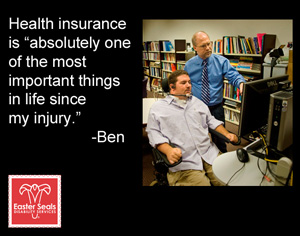A happy day — what the Supreme Court’s ruling means to people with disabilities
by Katy
 Wow — this is a really happy day!
Wow — this is a really happy day!
Everyday, we advocate for access to appropriate and high quality health care services for everyone we serve. And with this morning’s Supreme Court ruling on the Affordable Care Act (ACA), the Court ensures the continuation of the law’s policies that protect access to private health insurance for children with pre-existing conditions and young adult dependent children up to the age of 26, bar lifetime health insurance caps, and leaves in place the essential policies that will take effect in 2014.
Simply put, the ACA is critical to millions of families living with disabilities. The Court’s ruling today tells our families they can make decisions about what is best for them as a family, and not be controlled by fear of losing health insurance coverage.
Over the course of the past several weeks, I’ve been up at night worrying about the impact of this decision on our clients. Someone said this morning, “prior to the ACA, all of us were all one car accident away from bankruptcy, or a life of poverty and dependence.” No one knows that better than Ben Trockman. Here’s what Ben has to say:
Health insurance is absolutely one of the most important things in my life since my injury. Without having health insurance, I would not have been able to attend many different places around the country, from the Shephard Center in Atlanta and Kennedy Krieger in Baltimore to Easter Seals here in Evansville, where I learned more about my injury and the way life would change.
We learned, basically, how life is different with an injury such as mine, and how to deal with things on a day-to-day basis. We worked with different types of therapy, getting used to my wheelchair, knowing how to treat my body and how dangerous pressure sores were. We gained knowledge about so many important things that would have never been possible because of the extreme expenses, without health insurance. I figured out how much my body could do physically. I spent 3 months doing very intensive therapy, 5 hours a day. I learned so much about the way to treat my body with exercise and how important it was.
And now, I look around my room, all the important things that make life a little easier … my wheelchair, my alternating air pressure mattress on my bed, the lift above my bed that helps move me to and from … NONE of that would have been affordable without health insurance.
Or, for Caroline Long, a sweet 11-year-old girl, whose fun personality comes through despite her inability to speak. She’s a fifth grader from Alabama, who loves school and outings with her family. Caroline has Rett syndrome. Generally considered a severe form of autism, it especially affects expressive language and hand use.
When it comes to health insurance, her mom Drew Ann Long believes:
It would be devastating to lose, it’s that critical. It helps provide Caroline with a quality of life that would be compromised. Having a child with multiple medical needs, never knowing what is around the next corner, I simply cannot imagine not having health insurance. I love having the freedom to choose the doctors I want. Health insurance provides a level of “freedom” from worry, to some degree. Every aspect of Caroline’s existence, and our family’s, is dependent upon health insurance.
The ACA is changing the lives of millions of people living with disabilities. Families no longer have to worry about the financial consequences of not having insurance because the ACA ensures children with pre-existing conditions cannot be dropped from private health insurance. Similarly, individuals with chronic health conditions don’t have to worry about losing coverage if they need care that exceeds their insurance company’s lifetime cap. In 2014, adults with disabilities who have pre-existing conditions will soon be able to buy health insurance that meets their needs. The ACA also provides guidance to states to increase the availability of home and community-based services so people with disabilities can access needed care in settings other than nursing homes.
We just learned that the House of Representatives has scheduled a vote to repeal the Affordable Care Act for the week of July 9, 2012. Watch this blog for more information about how you can share your views on this important topic.
Woo Hoo!







July 2nd, 2012 at 3:27 pm
Hi Peggy,
Transportation for people with disabilities and older adults who can no longer drive is a priority for Easter Seals. We have two national programs, Easter Seals Project ACTION and the National Center on Senior transportation, that focus on improving and increasing transportation services for people in need.
While these programs do not provide direct services, no rides, I would like to talk with you to see if we can help connect you with an organization in your area that can help. Please contact me directly and let me know your city and state. Often the local Area Agency on Aging has lists of transportation resources for elders in their areas. You can find your Area Agency on Aging by calling the Eldercare Locator at: 1-800-677-1116.
Thanks,
Lucinda Shannon
Training and Technical Assistance Specialist
National Center on Senior Transportation
lucindashannon@easterseals.com
866-528-6278
June 30th, 2012 at 8:00 pm
I’m 81 and disabled (spinal cord injury)with several other serious health issues.
We have NO transportation out of this area. The Senior citizen bus is supposed to take us to doctor’s appointments, but they don’t. Please is any help available?